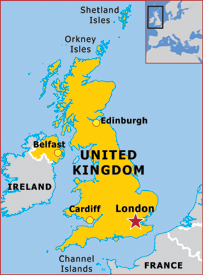United Kingdom-Scotland
 Scotland Overview
Scotland OverviewScotland’s scenery is as varied as it is beautiful. Rugged mountain peaks sweep down to breathtaking lochs glistening in remote glens like Glen Affric near Inverness and Loch Trool in Galloway. A straggling coastline, with white sandy beaches, sheltered bays and rocky cliffs looks out to the remote islands of the Atlantic. To the south, the rolling hills of the Borders, lush lowland pastures and extensive woodlands present a softer beauty. Scotland’s capital, Edinburgh, is among the outstanding cities of the world, where the Medieval Old Town contrasts with the elegant Georgian New Town. Other towns, notably Glasgow, display a wealth of Victorian architecture. Everywhere you’ll find ancient castles and houses, prehistoric forts, stone circles and burial mounds, particularly at the Neolithic Heart of Orkney, Scotland’s latest World Heritage Site. Scotland’s rich musical heritage has feet tapping to bagpipes, fiddles and accordions. The best Celtic music can be heard at either the Girvan Traditional Folk Festival in May or the Newcastleton Festival in July. Scotland is a paradise for outdoor enthusiasts. Play golf on the world’s most famous course at St. Andrews. Go fishing, sailing, diving, or join the walkers, cyclists and climbers on the hills, in woodlands and on deserted country lanes. Finally, at the end of the day, relax with Scotland’s greatest export, a dram of fine malt whiskey.
General Information
Area: 77,925 sq km (30,086 sq miles)
Population: 5,114,600
Capital: Edinburgh
Geography: The country consists of the southern Lowland area, a region of moorland and pastoral scenery where most of the population is concentrated and the Northern Highlands, dominated by the Grampian Mountains and Ben Nevis, the highest peak in the British Isles. The whole of the exceedingly beautiful coastline is indented with lochs (particularly in the north and west). Off the West Coast there are many islands, the largest of which are Skye and Lewis, the latter being part of the Outer Hebrides. The Orkney and Shetland Islands lie to the northeast of the Scottish mainland, across the Pentland Firth from John O’Groats.
Language: English
Money
Currency: Pound (£)
Credit Cards: American Express, Diners Club, MasterCard and Visa are widely accepted.
Travelers Checks: Widely accepted.
Banking Hours: 9am-5pm Monday to Friday. Some branches of certain banks are open Saturday morning.
Currency Exchange: Money can be exchanged in banks, exchange bureaux and many hotels. The exchange bureaux are often open outside banking hours but charge higher commission rates.
International Travel
Approximate flight times:
London to Glasgow 1 hour 15 minutes
New York to Glasgow 6 hours 30 minutes
Chicago to Glasgow is 7 hours 25 minutes
Los Angeles to Glasgow 11 hours 30 minutes (via London)
International Airports
Edinburgh (EDI) (www.baa.co.uk/main/airports/edinburgh) Located 11km (7 miles) West of the city center. Facilities include duty free, general and specialist shops, tourist information, hotel reservations service, bureau de change, emergency first-aid facilities, parent and baby room, buffet, coffee and snack bars, conference facilities for 30 and facilities for the disabled such as toilets, wheelchairs, induction loops, telephone and swivel seats in some taxis. Train/bus service. Taxi: travel time to city center 25 minutes.
Glasgow (GLA) (www.baa.com.uk/main/airports/glasgow) Located 14km (9 miles) west of the city center. Facilities include 24-hour emergency medical services, left luggage, general shops, pharmacy, post office, 24-hour buffet, bar cafes, restaurants, duty-free shop, hotel reservation service, conference and facilities for the disabled: wheelchairs, toilets and telephones. Taxi: To the city center is 20 minutes; to Paisley BR station is 5 minutes. Taxis are available from the rank on the terminal forecourt. Car hire: Alamo, Avis, Europcar and Hertz have desks outside International Arrivals.
Social & Business Customs
Food
in the main cities and towns, a wide variety of British and continental food is available. Local dishes include haggis (chopped oatmeal and offal cooked in the stomach of a sheep), cullen skink (fish soup), smoked haddock and salmon and partan bree (crab with rice and cream). Baked food such as cakes and biscuits are exceedingly popular and some of the more famous are flat pancake-type scones, oatcakes and black bun, a fruit cake on a pastry base.
Drink
Scotch whisky is the national drink and is famous the world over. There are also many local beers, known as light and heavy, as well as lager. Licensing hours are subject to greater variation than in England. Some pubs may be open from 10:30am-12noon, other only 11:30am-2:30pm and 6:30pm-11pm.
Nightlife
In major cities there are many bars, restaurants, nightclubs, theaters and cinemas. Nightlife may be more limited in the smaller villages and islands.
Business
People are generally expected to dress smartly (suits are the norm). Appointments should be made and the exchange of business cards is customary. Office hours: 9am-5pm or 9:30am-4:30pm Monday to Friday.
Climate
Scotland is rarely much colder than England, despite its more northerly latitude. The west tends to be wetter and warmer than the cool dry east. On upland areas snow is common in winter, and fog and mist may occur at any time of year.


